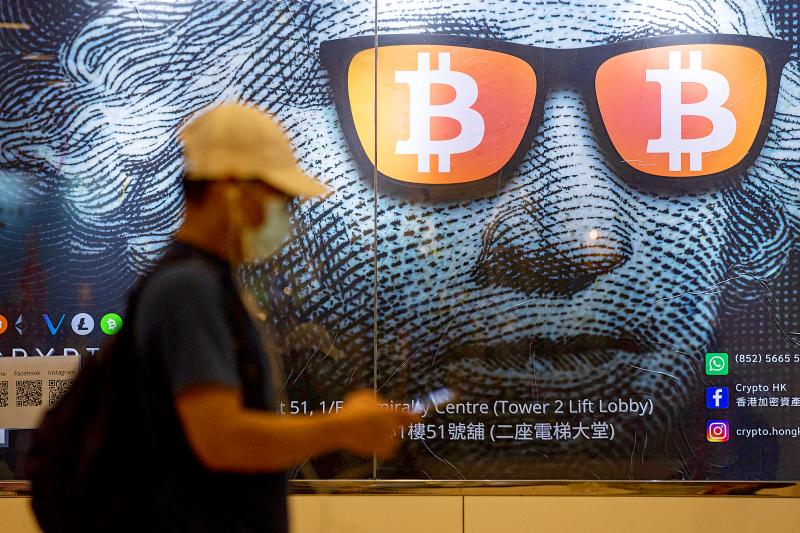Two of the world’s largest bitcoin exchanges have halted new registrations for Chinese users, taking one of the first actions to comply with Beijing’s latest cryptocurrency ban.
Exchange operators Huobi (火幣) and Binance (幣安) have stopped letting traders use mainland China mobile numbers to register new accounts, after the People’s Bank of China (PBOC) on Friday said that all crypto-related transactions would be considered illicit financial activity.
New sign-ups are still available for Hong Kong users on both platforms, but mainland China is no longer an option for new-account creation.

Photo: EPA-EFE
A Huobi spokesperson declined to comment, while a Binance spokesperson said the company does not have exchange operations in China and blocks Chinese IP addresses, without commenting on the mobile registration move.
“Binance takes its compliance obligations very seriously and is committed to following local regulator requirements wherever we operate,” the spokesperson said in an e-mail.
China’s latest pronouncement — issued by the central bank along with nine other government agencies including the public security ministry — is the culmination of years of attempted crackdowns on the rise of bitcoin and its peers.
Friday’s notice specifically called out offshore exchanges targeting Chinese users, banning them from hiring locally for roles from marketing to payment settlement and tech.
In 2017, China told local exchanges to stop hosting trades between fiat money and crypto tokens, forcing Huobi and Binance to set up shops in friendlier jurisdictions such as Singapore and Malta for their main trading platforms.
Still, Chinese users have been able to access their services including over-the-counter trading and crypto-to-crypto transactions.
In June, Huobi banned Chinese users from trading riskier products such as derivatives, after China’s Cabinet called for a renewed clampdown on crypto trading and mining.
There is no indication that Chinese users are barred from Huobi and Binance altogether, which are widely regarded as two of the big three crypto exchanges that originated in China, along with OKEx.
Users can still use mainland China numbers to register on OKEx as of yesterday morning in Hong Kong.
The PBOC’s announcement comes as countries around the world tighten the regulatory screw with the US threatening industry players with lawsuits or cease-and-desist orders. China’s stance comes as the Chinese Communist Party seeks bring key industries to heel from online gaming and tutoring to high-frequency trading.
“This is the latest and perhaps final stage of the Chinese government’s crackdown on crypto,” said Jehan Chu (朱沛宗), founder of investment firm Kenetic Capital in Hong Kong. “China has been consistent about its desire to rid itself of free trading in cryptocurrencies and emphasize more controlled projects.”

Anna Bhobho, a 31-year-old housewife from rural Zimbabwe, was once a silent observer in her home, excluded from financial and family decisionmaking in the deeply patriarchal society. Today, she is a driver of change in her village, thanks to an electric tricycle she owns. In many parts of rural sub-Saharan Africa, women have long been excluded from mainstream economic activities such as operating public transportation. However, three-wheelers powered by green energy are reversing that trend, offering financial opportunities and a newfound sense of importance. “My husband now looks up to me to take care of a large chunk of expenses,

SECTOR LEADER: TSMC can increase capacity by as much as 20 percent or more in the advanced node part of the foundry market by 2030, an analyst said Taiwan Semiconductor Manufacturing Co (TSMC, 台積電) is expected to lead its peers in the advanced 2-nanometer process technology, despite competition from Samsung Electronics Co and Intel Corp, TrendForce Corp analyst Joanne Chiao (喬安) said. TSMC’s sophisticated products and its large production scale are expected to allow the company to continue dominating the global 2-nanometer process market this year, Chiao said. The world’s largest contract chipmaker is scheduled to begin mass production of chips made on the 2-nanometer process in its Hsinchu fab in the second half of this year. It would also hold a ceremony on Monday next week to

TECH CLUSTER: The US company’s new office is in the Shalun Smart Green Energy Science City, a new AI industry base and cybersecurity hub in southern Taiwan US chip designer Advanced Micro Devices Inc (AMD) yesterday launched an office in Tainan’s Gueiren District (歸仁), marking a significant milestone in the development of southern Taiwan’s artificial intelligence (AI) industry, the Tainan City Government said in a statement. AMD Taiwan general manager Vincent Chern (陳民皓) presided over the opening ceremony for the company’s new office at the Shalun Smart Green Energy Science City (沙崙智慧綠能科學城), a new AI industry base and cybersecurity hub in southern Taiwan. Facilities in the new office include an information processing center, and a research and development (R&D) center, the Tainan Economic Development Bureau said. The Ministry

ADVERSARIES: The new list includes 11 entities in China and one in Taiwan, which is a local branch of Chinese cloud computing firm Inspur Group The US added dozens of entities to a trade blacklist on Tuesday, the US Department of Commerce said, in part to disrupt Beijing’s artificial intelligence (AI) and advanced computing capabilities. The action affects 80 entities from countries including China, the United Arab Emirates and Iran, with the commerce department citing their “activities contrary to US national security and foreign policy.” Those added to the “entity list” are restricted from obtaining US items and technologies without government authorization. “We will not allow adversaries to exploit American technology to bolster their own militaries and threaten American lives,” US Secretary of Commerce Howard Lutnick said. The entities